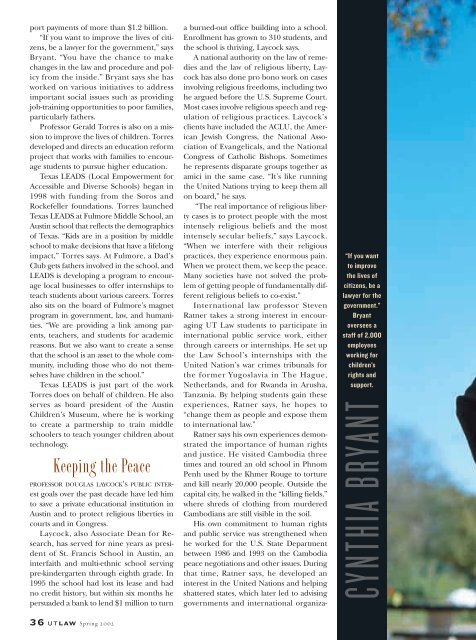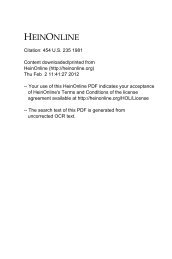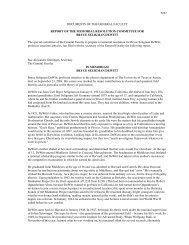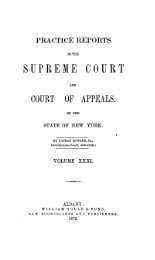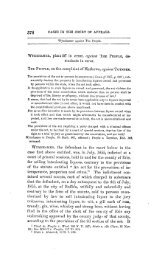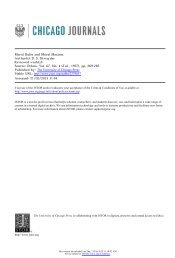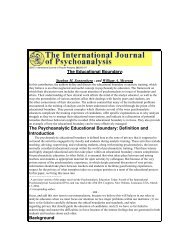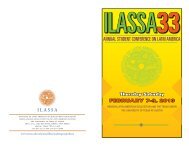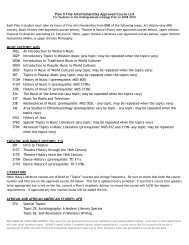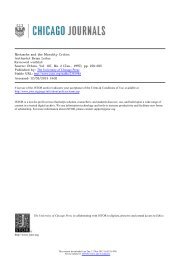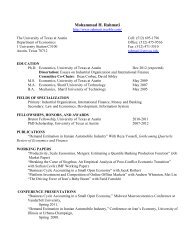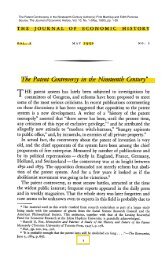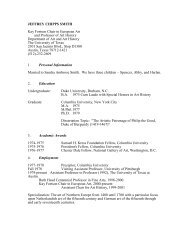Spring 2002 - The University of Texas at Austin
Spring 2002 - The University of Texas at Austin
Spring 2002 - The University of Texas at Austin
Create successful ePaper yourself
Turn your PDF publications into a flip-book with our unique Google optimized e-Paper software.
port payments <strong>of</strong> more than $1.2 billion.<br />
“If you want to improve the lives <strong>of</strong> citizens,<br />
be a lawyer for the government,” says<br />
Bryant. “You have the chance to make<br />
changes in the law and procedure and policy<br />
from the inside.” Bryant says she has<br />
worked on various initi<strong>at</strong>ives to address<br />
important social issues such as providing<br />
job-training opportunities to poor families,<br />
particularly f<strong>at</strong>hers.<br />
Pr<strong>of</strong>essor Gerald Torres is also on a mission<br />
to improve the lives <strong>of</strong> children. Torres<br />
developed and directs an educ<strong>at</strong>ion reform<br />
project th<strong>at</strong> works with families to encourage<br />
students to pursue higher educ<strong>at</strong>ion.<br />
<strong>Texas</strong> LEADS (Local Empowerment for<br />
Accessible and Diverse Schools) began in<br />
1998 with funding from the Soros and<br />
Rockefeller found<strong>at</strong>ions. Torres launched<br />
<strong>Texas</strong> LEADS <strong>at</strong> Fulmore Middle School, an<br />
<strong>Austin</strong> school th<strong>at</strong> reflects the demographics<br />
<strong>of</strong> <strong>Texas</strong>. “Kids are in a position by middle<br />
school to make decisions th<strong>at</strong> have a lifelong<br />
impact,” Torres says. At Fulmore, a Dad’s<br />
Club gets f<strong>at</strong>hers involved in the school, and<br />
LEADS is developing a program to encourage<br />
local businesses to <strong>of</strong>fer internships to<br />
teach students about various careers. Torres<br />
also sits on the board <strong>of</strong> Fulmore’s magnet<br />
program in government, law, and humanities.<br />
“We are providing a link among parents,<br />
teachers, and students for academic<br />
reasons. But we also want to cre<strong>at</strong>e a sense<br />
th<strong>at</strong> the school is an asset to the whole community,<br />
including those who do not themselves<br />
have children in the school.”<br />
<strong>Texas</strong> LEADS is just part <strong>of</strong> the work<br />
Torres does on behalf <strong>of</strong> children. He also<br />
serves as board president <strong>of</strong> the <strong>Austin</strong><br />
Children’s Museum, where he is working<br />
to cre<strong>at</strong>e a partnership to train middle<br />
schoolers to teach younger children about<br />
technology.<br />
Keeping the Peace<br />
PROFESSOR DOUGLAS LAYCOCK’S PUBLIC INTERest<br />
goals over the past decade have led him<br />
to save a priv<strong>at</strong>e educ<strong>at</strong>ional institution in<br />
<strong>Austin</strong> and to protect religious liberties in<br />
courts and in Congress.<br />
Laycock, also Associ<strong>at</strong>e Dean for Research,<br />
has served for nine years as president<br />
<strong>of</strong> St. Francis School in <strong>Austin</strong>, an<br />
interfaith and multi-ethnic school serving<br />
pre-kindergarten through eighth grade. In<br />
1995 the school had lost its lease and had<br />
no credit history, but within six months he<br />
persuaded a bank to lend $1 million to turn<br />
36 UTLAW <strong>Spring</strong> <strong>2002</strong><br />
a burned-out <strong>of</strong>fice building into a school.<br />
Enrollment has grown to 310 students, and<br />
the school is thriving, Laycock says.<br />
A n<strong>at</strong>ional authority on the law <strong>of</strong> remedies<br />
and the law <strong>of</strong> religious liberty, Laycock<br />
has also done pro bono work on cases<br />
involving religious freedoms, including two<br />
he argued before the U.S. Supreme Court.<br />
Most cases involve religious speech and regul<strong>at</strong>ion<br />
<strong>of</strong> religious practices. Laycock’s<br />
clients have included the ACLU, the American<br />
Jewish Congress, the N<strong>at</strong>ional Associ<strong>at</strong>ion<br />
<strong>of</strong> Evangelicals, and the N<strong>at</strong>ional<br />
Congress <strong>of</strong> C<strong>at</strong>holic Bishops. Sometimes<br />
he represents dispar<strong>at</strong>e groups together as<br />
amici in the same case. “It’s like running<br />
the United N<strong>at</strong>ions trying to keep them all<br />
on board,” he says.<br />
“<strong>The</strong> real importance <strong>of</strong> religious liberty<br />
cases is to protect people with the most<br />
intensely religious beliefs and the most<br />
intensely secular beliefs,” says Laycock.<br />
“When we interfere with their religious<br />
practices, they experience enormous pain.<br />
When we protect them, we keep the peace.<br />
Many societies have not solved the problem<br />
<strong>of</strong> getting people <strong>of</strong> fundamentally different<br />
religious beliefs to co-exist.”<br />
Intern<strong>at</strong>ional law pr<strong>of</strong>essor Steven<br />
R<strong>at</strong>ner takes a strong interest in encouraging<br />
UT Law students to particip<strong>at</strong>e in<br />
intern<strong>at</strong>ional public service work, either<br />
through careers or internships. He set up<br />
the Law School’s internships with the<br />
United N<strong>at</strong>ion’s war crimes tribunals for<br />
the former Yugoslavia in <strong>The</strong> Hague,<br />
Netherlands, and for Rwanda in Arusha,<br />
Tanzania. By helping students gain these<br />
experiences, R<strong>at</strong>ner says, he hopes to<br />
“change them as people and expose them<br />
to intern<strong>at</strong>ional law.”<br />
R<strong>at</strong>ner says his own experiences demonstr<strong>at</strong>ed<br />
the importance <strong>of</strong> human rights<br />
and justice. He visited Cambodia three<br />
times and toured an old school in Phnom<br />
Penh used by the Khmer Rouge to torture<br />
and kill nearly 20,000 people. Outside the<br />
capital city, he walked in the “killing fields,”<br />
where shreds <strong>of</strong> clothing from murdered<br />
Cambodians are still visible in the soil.<br />
His own commitment to human rights<br />
and public service was strengthened when<br />
he worked for the U.S. St<strong>at</strong>e Department<br />
between 1986 and 1993 on the Cambodia<br />
peace negoti<strong>at</strong>ions and other issues. During<br />
th<strong>at</strong> time, R<strong>at</strong>ner says, he developed an<br />
interest in the United N<strong>at</strong>ions and helping<br />
sh<strong>at</strong>tered st<strong>at</strong>es, which l<strong>at</strong>er led to advising<br />
governments and intern<strong>at</strong>ional organiza- CYNTHIA<br />
“If you want<br />
to improve<br />
the lives <strong>of</strong><br />
citizens, be a<br />
lawyer for the<br />
government.”<br />
Bryant<br />
oversees a<br />
staff <strong>of</strong> 2,000<br />
employees<br />
working for<br />
children’s<br />
rights and<br />
support.<br />
BRYANT


